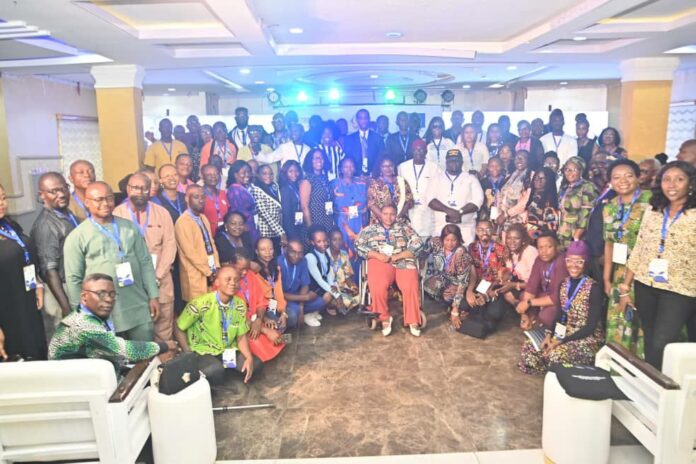A South-East Regional Conference on Improving Regulatory Environment for CSO Operations in Nigeria, has ended in Awka, Anambra State with a call on government at the sub-national level to appreciate the critical role the civil society plays in fostering sustainable development.
The Conference with the theme “Building Strategic Partnerships for a Sustainable Operational Environment for the non-profit sector in Nigeria”, organised by Global Rights in collaboration with Anambra State Government, was supported by European Union.
Angel Network News (ANN) reports that the event drew participants from various parts of the country especially the five states of the region.
In keynote address, the Speaker, Anambra State House of Assembly, Rt. Hon. Somtochukwu Udeze, urged legislators at subnational levels, particularly those in Southeast to see civil society organizations as partners in the advancement of democratic ethos.
According to Udeze, the success of CSOs in driving sustainable development and social change depends largely on the policy and legislative environment in which they operate, hence the need for strategic partnership to make the environment more friendly for them.
“By enacting laws that promote accountability, facilitate partnerships, ensure safety, and foster inclusion, these legislatures can significantly improve the operations of CSOs, enabling them to fulfill their mandate more effectively.
“As we look forward to building a more inclusive, just, and progressive society, posterity beckons, and we all must work together to achieve the necessary operating environment to improve the CSO operational environment in the state,” the Speaker noted.
In his welcome address, a Steering Committee Member, Community of Practice on Civic Space Strengthening, Kelechukwu Okezie, stressed the need for Southeast state governments to break down barriers and promote inclusivity, partnership and sustainable development.
Okezie, while acknowledging the pivotal role of CSOs in national development, promotion of human rights, deepening democracy, and supporting marginalized communities, however regretted that regulatory framework governing CSOs operations in Nigeria often posed challenges that hinder full realization of their potential.
“Today marks a significant step toward fostering a more enabling environment for civil society organizations across our region and nation. The operational environment across the states in the South East is one of challenges, risks and opportunities especially for actors in the human rights, anti corruption and democracy and good governance.
“This conference organised by Global Rights serves as a veritable platform for state and non state actors and other stakeholders in the zone to share experiences, identify barriers, and propose actionable strategies that will enhance the regulatory framework for CSOs not only in the South East but Nigeria as a whole.
The Executive Director, Global Rights, Abiodun Baiyewu expressed confidence that the conference would throw up common understanding on the harmonization of regulatory frameworks at states’ level as well as policy that could assist CSOs operate seamlessly.
Baiyewu who spoke through Program Manager, Edosa Oviawe said, debunked the understanding within the regulatory circle that CSOs do not want to be regulated. Rather, the position of the CSOs is that the frameworks should be done in a way that solutions are created.
The CSOs are asking to co-create these policies because you can’t shave a man’s head in his absence. We are having multiplicity of regulatory frameworks across the states, which pose huge challenges.
“We have a situation where an NGO that has obtained a CAC registration is asked by various State Ministries to come and register with them and pay dues and declare returns and renewal of certificates. These cumbersome requirements are stiffling the work the NGOs and shrinking the civic space.
“We’re hoping to use this conference to come up wit a common understanding on how we can hamornize these regulatory frameworks at the state level and get a policy that can help the CSOs operate seamlessly.
“Government can also have a database of CSOs working in diverse areas and provide the necessary support whenever such is needed, as the overall work of these CSOs are for the good of the people, who the government actually, exists for.”
In the panel session during the event, government and non-governmental experts brainstormed on all operational inhibitions and proffered solutions to them hoping for improved environment that can engender greater efficiency.





